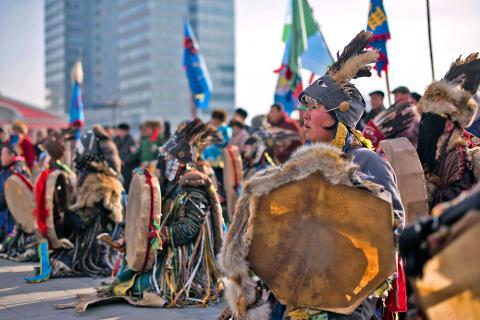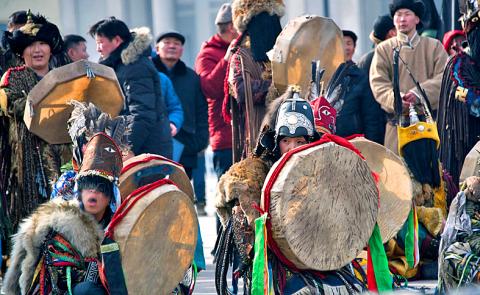Chanting prayers to Tenger, the all-knowing holy sky, Mongolian shamans in fur and feather headdresses protested against a Canadian mining project they say threatens ancient grave sites.
“It’s for our love for Mongolia, to protect our resources and territory,” said Tseyen-Oidoviin Sarantuya, who traveled more than 1,000km to demonstrate in Ulan Bator’s main square against the venture.
“I want people to know that Mongolia should remain Mongolian,” she said.

Photo: AFP
Beneath Mongolia’s expansive, largely empty steppes lie coal, copper, gold, iron ore and other minerals whose worth is estimated at more than US$1 trillion — wealth that could transform the lives of its 3 million inhabitants.
However, efforts to extract it have tottered in the face of incessant internal fighting over how much control and profit foreign companies should be allowed, and deep-rooted suspicions of outsiders.
Several naturally endowed countries — such as Venezuela, Myanmar and Nigeria — are regarded as having failed through corruption, bad governance or economic mismanagement to fully realize or effectively distribute the benefits of their bounties.

Photo: AFP
“Mongolia already faces the resource curse. It is reality now,” said Gantumuriin Uyanga, a member of the State Great Hural Parliament.
Her Mongolian National Democratic Party is part of the ruling coalition, but she said spiritual appeals illustrated authorities’ failure to spread the wealth.
“It seems to me truly unfortunate that people are asking help from the sky because of the poor governance in Mongolia,” she said.
Four years ago, the country led the world in economic growth at 17.5 percent, thanks to a minerals boom exemplified by the vast Oyu Tolgoi copper and gold mine in the Gobi desert, controlled by Anglo-Australian resources giant Rio Tinto.
However, rising resource nationalism and an increasingly stringent business environment have dampened investor enthusiasm, while the global commodity bust makes exploiting them less profitable.
Last year, foreign direct investment into the landlocked country plummeted 74 percent, Mongolian central bank data shows, and economic growth dropped to 7.8 percent.
The Asian Development Bank forecasts expansion will plunge by more than half this year, to just 3 percent.
University of British Columbia Mongolia expert Julian Dierkes said the country was still finding its way in the capricious world of international finance and was simultaneously “the object of desire and scorn for global capitalism.”
Now authorities are trying to break the logjam.
In February, Mongolia’s president pardoned three foreign former mining executives who had been jailed for tax evasion in a case that spooked investors.
Earlier this month, Mongolian Prime Minister Chimediin Saikhanbileg — who can reportedly bench-press 175kg — announced the government and Rio Tinto had agreed “in principle” to go ahead with Oyu Tolgoi’s stalled second phase, saying that making “historic decisions” was his duty.
Rio Tinto chief executive Sam Walsh told the company’s annual meeting last week discussions were continuing.
Ulan Bator has a national dilemma to contend with.
The proud homeland of pan-Asian conqueror Genghis Khan, in more recent centuries, Mongolia has frequently been a geopolitical pawn in the power plays of huge neighbors China and Russia, both of which have dominated it in turn.
Sodnomiin Tsetsgee, a kindergarten teacher expecting her first child, was among the many who boycotted a controversial text message referendum that backed stalled foreign resources investment ahead of the prime minister’s Oyu Tolgoi announcement.
“We should use our resources for ourselves,” she said. “It’s not good that only foreigners benefit from them.”
Mongolia’s nomadic heritage, traditional animistic beliefs and nearly seven decades of communism have given it an enduring sense of the land as common wealth — private land ownership was only constitutionally recognized after the country’s 1990 democratization.
Myagmarjaviin Enkhzaya, vice president of the Institute of Mongol National Shamans, took part in the Ulan Bator protest and says Toronto-based Centerra Gold’s plan would harm culturally important graves.
The company says the burial sites’ locations are known and it will not interfere with them.
However, Enkhzaya said: “We want people to understand that while you sleep, greedy people will be exploiting Mongolian natural resources, as well as the mountains we worship. There will be no land to inherit in future because corrupt politicians are selling it away.”
At the same time, Mongolia’s US$1.3 trillion in mineral riches are a treasure trove in a country with a GDP of just US$12 billion.
The result can be conflicting attitudes.
Some shamans have turned down lucrative jobs with mining companies out of spiritual concerns, University of Washington researcher Amalia Rubin said.
“There’s very much this internal argument between wanting Mongolia to develop and wanting Mongolian people to get the benefits of economic development, with the idea of propitiating the earth spirits and also following traditional Mongolian customs,” she said.

PATENTS: MediaTek Inc said it would not comment on ongoing legal cases, but does not expect the legal action by Huawei to affect its business operations Smartphone integrated chips designer MediaTek Inc (聯發科) on Friday said that a lawsuit filed by Chinese smartphone brand Huawei Technologies Co (華為) over alleged patent infringements would have little impact on its operations. In an announcement posted on the Taiwan Stock Exchange, MediaTek said that it would not comment on an ongoing legal case. However, the company said that Huawei’s legal action would have little impact on its operations. MediaTek’s statement came after China-based PRIP Research said on Thursday that Huawei filed a lawsuit with a Chinese district court claiming that MediaTek infringed on its patents. The infringement mentioned in the lawsuit likely involved

Taipei is today suspending work, classes and its US$2.4 trillion stock market as Typhoon Gaemi approaches Taiwan with strong winds and heavy rain. The nation is not conducting securities, currency or fixed income trading, statements from its stock and currency exchanges said. Authorities had yesterday issued a warning that the storm could affect people on land and canceled some ship crossings and domestic flights. Taiwan Semiconductor Manufacturing Co (TSMC, 台積電) expects its local chipmaking fabs to maintain normal production, the company said in an e-mailed statement. The main chipmaker for Apple Inc and Nvidia Corp said it has activated routine typhoon alert

GROWTH: TSMC increased its projected revenue growth for this year to more than 25 percent, citing stronger-than-expected demand for AI devices and smartphones The Taiwan Institute of Economic Research (TIER, 台灣經濟研究院) yesterday raised its forecast for Taiwan’s GDP growth this year from 3.29 percent to 3.85 percent, as exports and private investment recovered faster than it predicted three months ago. The Taipei-based think tank also expects that Taiwan would see a 8.19 percent increase in exports this year, better than the 7.55 percent it projected in April, as US technology giants spent more money on artificial intelligence (AI) infrastructure and development. “There will be more AI servers going forward, but it remains to be seen if the momentum would extend to personal computers, smartphones and

Catastrophic computer outages caused by a software update from one company have once again exposed the dangers of global technological dependence on a handful of players, experts said on Friday. A flawed update sent out by the little-known security firm CrowdStrike Holdings Inc brought airlines, TV stations and myriad other aspects of daily life to a standstill. The outages affected companies or individuals that use CrowdStrike on the Microsoft Inc’s Windows platform. When they applied the update, the incompatible software crashed computers into a frozen state known as the “blue screen of death.” “Today CrowdStrike has become a household name, but not in